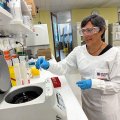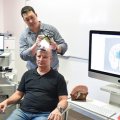The latest in world-class mining solutions will be offered directly to the Latin American region, with the establishment of a new office in Santiago, Chile.
JKTech Pty Ltd, which commercialises research from the Sustainable Minerals
Institute at The University of Queensland (UQ) in Brisbane, Australia, has opened the office to further provide technologies and skills to enhance the economic and social wealth of its Latin American industry partners.
UQ's Vice-Chancellor and President Professor Peter Høj will officially announce the opening of the Santiago office during a visit to Chile in April.
“As a research-intensive University among the world’s top 100 universities, it makes sense for UQ to work closely with industry to ensure our discoveries make it to the coalface sooner, so the benefits of good research are being felt even earlier than before,” Professor Høj said.
“This is particularly important in mining as we strive to seek greater solutions for safety, process efficiency and operational improvements in Chile, and in mining regions across the world,” he said.
Among UQ’s many recent research successes is the GroundProbe Slope Stability Radar , which helped revolutionise safety in mining through the detection of slope movement.
“By establishing an office in Chile, we can directly provide the support and mechanisms to help drive research outcomes to the market, and to directly benefit the people of Latin America,” Professor Høj said.
UQ currently has 15 formal research and academic agreements with 10 institutions in Chile. These are based on many shared interests and collaborations in areas including education, English language training, mining and energy, and health.
Key collaborations in Chile include:
• A collaborative English Language Institute (ELI) with the Universidad Católica del Norte (UCN) in Antofagasta, Chile. The pilot UQ-UCN ELI initiative was established in 2008 with seed funding from BHP-Billiton and Xstrata, and currently contributes regionally to human capital development through English communications training of students, academics, teachers, industry professionals and government officials. The ELI will be formalised as a joint venture company between UQ and UCN under Chilean law in May 2013, and its activities will expand to include English language test administration and related services.
• A long-term partnership between UQ and the Comision Nacional de Investigacion Cientifica y Tecnologica (CONICYT) to develop human capital and capacity-building in the areas of research and innovation. Chilean engineering undergraduate students have the opportunity to experience research, commercialisation of research and innovation processes at UQ while developing their English language skills in general, academic and research contexts.
• A research collaboration between UQ’s Parenting and Family Support Centre and the School of Medicine, Pontificia Universidad Católica de Chile through the world-renowned Triple P – Positive Parenting Program.
Professor Høj and UQ executives will visit Chile from April 27 to May 1, 2013 to reaffirm the valued links between the University and its Chilean partners, and to discuss future initiatives.
Media: Liz Rourke, UQ International, 07 3346 0665 or e.rourke@uq.edu.au
BACKGROUND
The University of Queensland is in the top 100 universities worldwide, measured by a number of major independent university rankings: the Academic Ranking of World Universities, Times Higher Education World University Rankings, QS World University Rankings and, Performance Ranking of Scientific Papers for World Universities.
UQ also has more specialised fields of research “well above world standard” than any other Australian university, according to the 2012 Excellence in Research for Australia (ERA) assessment.
UQ has enjoyed a long and successful bilateral engagement in Latin America dating back to the early 1980s, and has more than 45 official and informal collaborations with government agencies, universities and companies in the region.
.jpg)












